Assessment 1: Critique of Social Cognitive Theory in Health Promotion
VerifiedAdded on 2022/09/14
|7
|1776
|13
Report
AI Summary
This report critically analyzes the Social Cognitive Theory (SCT) and its application within the context of health promotion. The report begins with an introduction to the SCT, emphasizing its foundations in observational learning, self-efficacy, and reciprocal determinism. It then delves into the background and development of the theory, highlighting key researchers like Albert Bandura and its roots in behaviorism. The report provides an overview of research supporting SCT, illustrating its effectiveness in promoting health behaviors, such as self-care in diabetes patients and physical activity. The critique explores how SCT can guide behavior change at individual, community, and organizational levels. Finally, the report discusses the methods for evaluating the success of SCT-based interventions, including self-monitoring and self-reporting techniques. The report concludes by emphasizing the significance of SCT in addressing health issues and promoting well-being through education and behavioral modification.
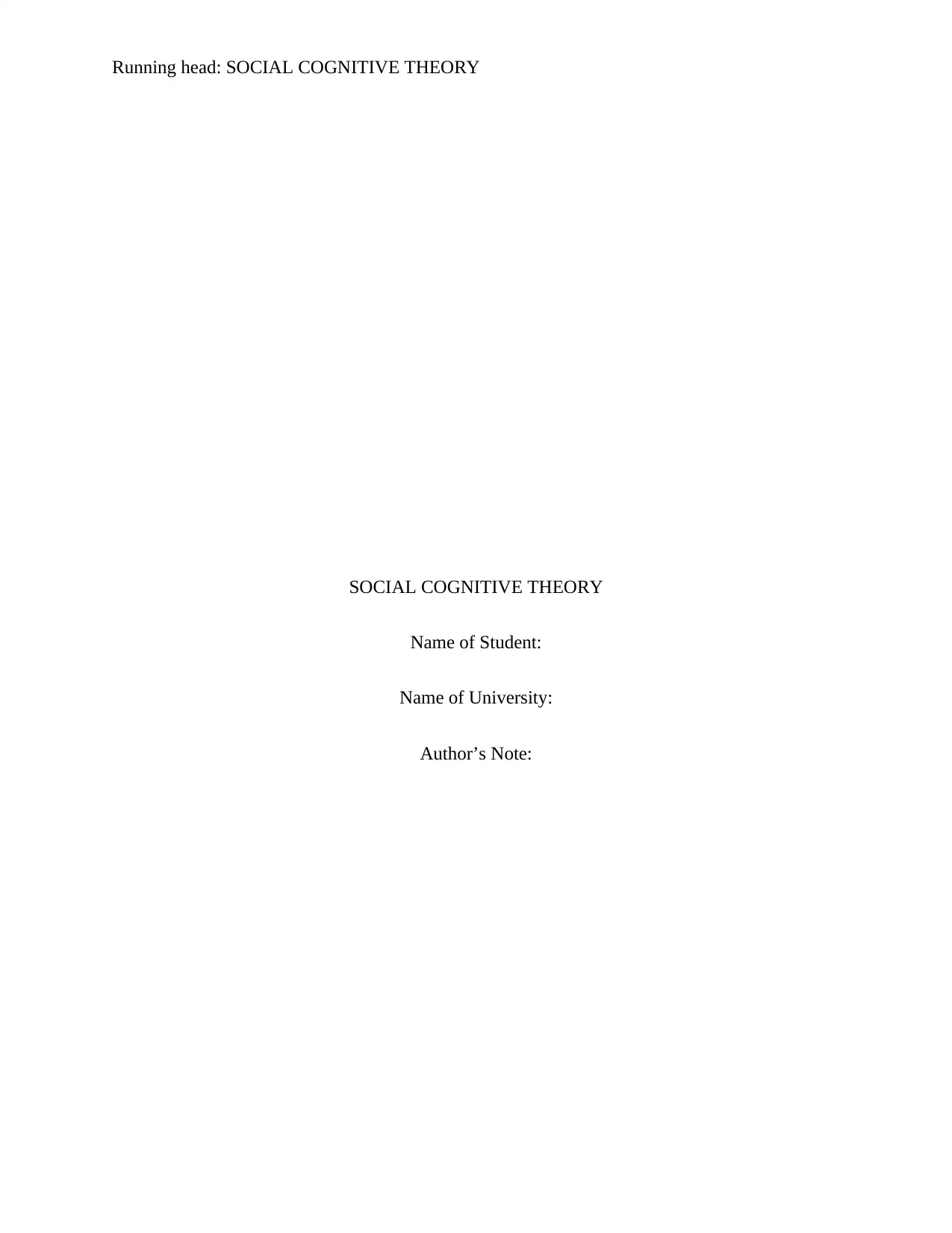
Running head: SOCIAL COGNITIVE THEORY
SOCIAL COGNITIVE THEORY
Name of Student:
Name of University:
Author’s Note:
SOCIAL COGNITIVE THEORY
Name of Student:
Name of University:
Author’s Note:
Paraphrase This Document
Need a fresh take? Get an instant paraphrase of this document with our AI Paraphraser
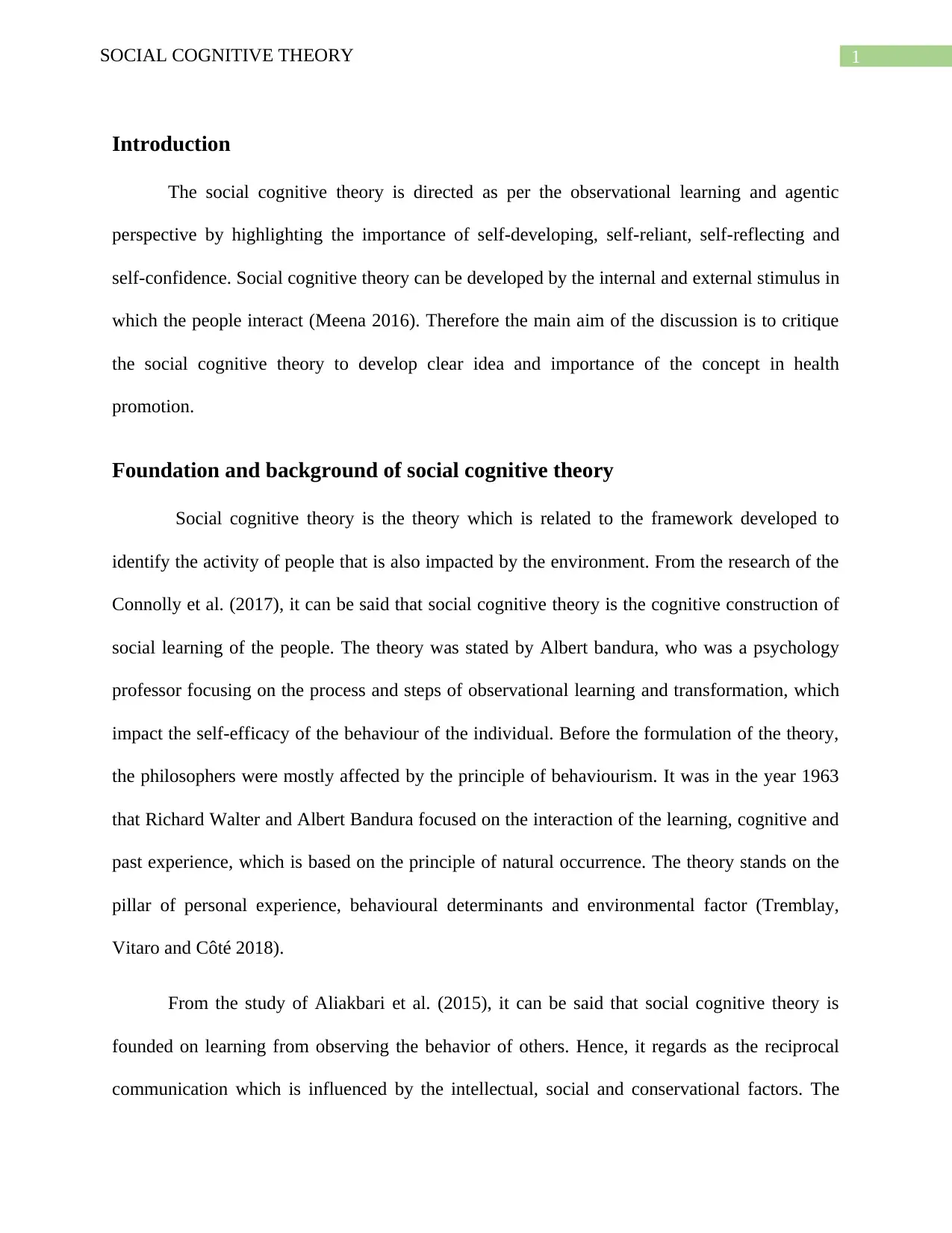
1SOCIAL COGNITIVE THEORY
Introduction
The social cognitive theory is directed as per the observational learning and agentic
perspective by highlighting the importance of self-developing, self-reliant, self-reflecting and
self-confidence. Social cognitive theory can be developed by the internal and external stimulus in
which the people interact (Meena 2016). Therefore the main aim of the discussion is to critique
the social cognitive theory to develop clear idea and importance of the concept in health
promotion.
Foundation and background of social cognitive theory
Social cognitive theory is the theory which is related to the framework developed to
identify the activity of people that is also impacted by the environment. From the research of the
Connolly et al. (2017), it can be said that social cognitive theory is the cognitive construction of
social learning of the people. The theory was stated by Albert bandura, who was a psychology
professor focusing on the process and steps of observational learning and transformation, which
impact the self-efficacy of the behaviour of the individual. Before the formulation of the theory,
the philosophers were mostly affected by the principle of behaviourism. It was in the year 1963
that Richard Walter and Albert Bandura focused on the interaction of the learning, cognitive and
past experience, which is based on the principle of natural occurrence. The theory stands on the
pillar of personal experience, behavioural determinants and environmental factor (Tremblay,
Vitaro and Côté 2018).
From the study of Aliakbari et al. (2015), it can be said that social cognitive theory is
founded on learning from observing the behavior of others. Hence, it regards as the reciprocal
communication which is influenced by the intellectual, social and conservational factors. The
Introduction
The social cognitive theory is directed as per the observational learning and agentic
perspective by highlighting the importance of self-developing, self-reliant, self-reflecting and
self-confidence. Social cognitive theory can be developed by the internal and external stimulus in
which the people interact (Meena 2016). Therefore the main aim of the discussion is to critique
the social cognitive theory to develop clear idea and importance of the concept in health
promotion.
Foundation and background of social cognitive theory
Social cognitive theory is the theory which is related to the framework developed to
identify the activity of people that is also impacted by the environment. From the research of the
Connolly et al. (2017), it can be said that social cognitive theory is the cognitive construction of
social learning of the people. The theory was stated by Albert bandura, who was a psychology
professor focusing on the process and steps of observational learning and transformation, which
impact the self-efficacy of the behaviour of the individual. Before the formulation of the theory,
the philosophers were mostly affected by the principle of behaviourism. It was in the year 1963
that Richard Walter and Albert Bandura focused on the interaction of the learning, cognitive and
past experience, which is based on the principle of natural occurrence. The theory stands on the
pillar of personal experience, behavioural determinants and environmental factor (Tremblay,
Vitaro and Côté 2018).
From the study of Aliakbari et al. (2015), it can be said that social cognitive theory is
founded on learning from observing the behavior of others. Hence, it regards as the reciprocal
communication which is influenced by the intellectual, social and conservational factors. The
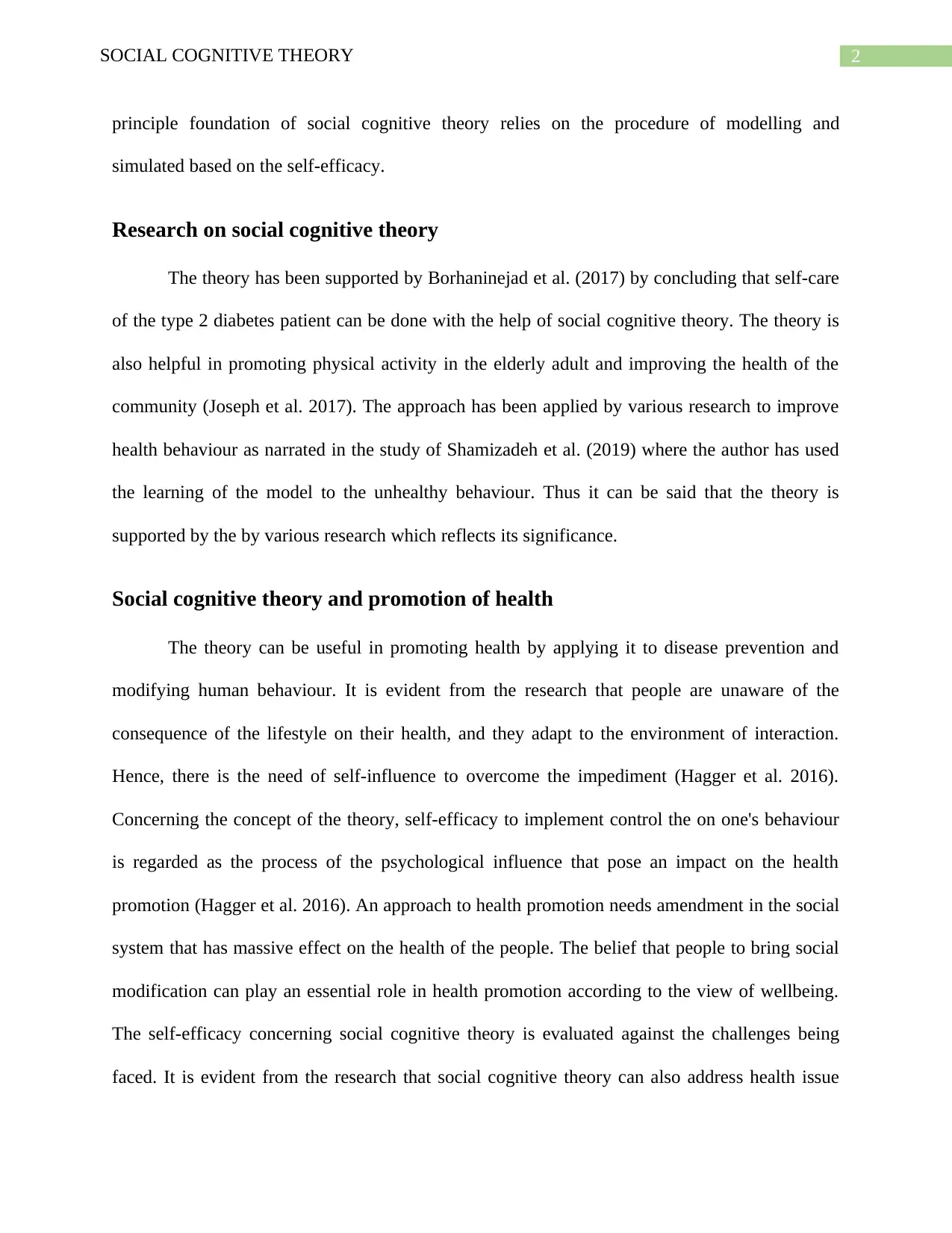
2SOCIAL COGNITIVE THEORY
principle foundation of social cognitive theory relies on the procedure of modelling and
simulated based on the self-efficacy.
Research on social cognitive theory
The theory has been supported by Borhaninejad et al. (2017) by concluding that self-care
of the type 2 diabetes patient can be done with the help of social cognitive theory. The theory is
also helpful in promoting physical activity in the elderly adult and improving the health of the
community (Joseph et al. 2017). The approach has been applied by various research to improve
health behaviour as narrated in the study of Shamizadeh et al. (2019) where the author has used
the learning of the model to the unhealthy behaviour. Thus it can be said that the theory is
supported by the by various research which reflects its significance.
Social cognitive theory and promotion of health
The theory can be useful in promoting health by applying it to disease prevention and
modifying human behaviour. It is evident from the research that people are unaware of the
consequence of the lifestyle on their health, and they adapt to the environment of interaction.
Hence, there is the need of self-influence to overcome the impediment (Hagger et al. 2016).
Concerning the concept of the theory, self-efficacy to implement control the on one's behaviour
is regarded as the process of the psychological influence that pose an impact on the health
promotion (Hagger et al. 2016). An approach to health promotion needs amendment in the social
system that has massive effect on the health of the people. The belief that people to bring social
modification can play an essential role in health promotion according to the view of wellbeing.
The self-efficacy concerning social cognitive theory is evaluated against the challenges being
faced. It is evident from the research that social cognitive theory can also address health issue
principle foundation of social cognitive theory relies on the procedure of modelling and
simulated based on the self-efficacy.
Research on social cognitive theory
The theory has been supported by Borhaninejad et al. (2017) by concluding that self-care
of the type 2 diabetes patient can be done with the help of social cognitive theory. The theory is
also helpful in promoting physical activity in the elderly adult and improving the health of the
community (Joseph et al. 2017). The approach has been applied by various research to improve
health behaviour as narrated in the study of Shamizadeh et al. (2019) where the author has used
the learning of the model to the unhealthy behaviour. Thus it can be said that the theory is
supported by the by various research which reflects its significance.
Social cognitive theory and promotion of health
The theory can be useful in promoting health by applying it to disease prevention and
modifying human behaviour. It is evident from the research that people are unaware of the
consequence of the lifestyle on their health, and they adapt to the environment of interaction.
Hence, there is the need of self-influence to overcome the impediment (Hagger et al. 2016).
Concerning the concept of the theory, self-efficacy to implement control the on one's behaviour
is regarded as the process of the psychological influence that pose an impact on the health
promotion (Hagger et al. 2016). An approach to health promotion needs amendment in the social
system that has massive effect on the health of the people. The belief that people to bring social
modification can play an essential role in health promotion according to the view of wellbeing.
The self-efficacy concerning social cognitive theory is evaluated against the challenges being
faced. It is evident from the research that social cognitive theory can also address health issue
⊘ This is a preview!⊘
Do you want full access?
Subscribe today to unlock all pages.

Trusted by 1+ million students worldwide
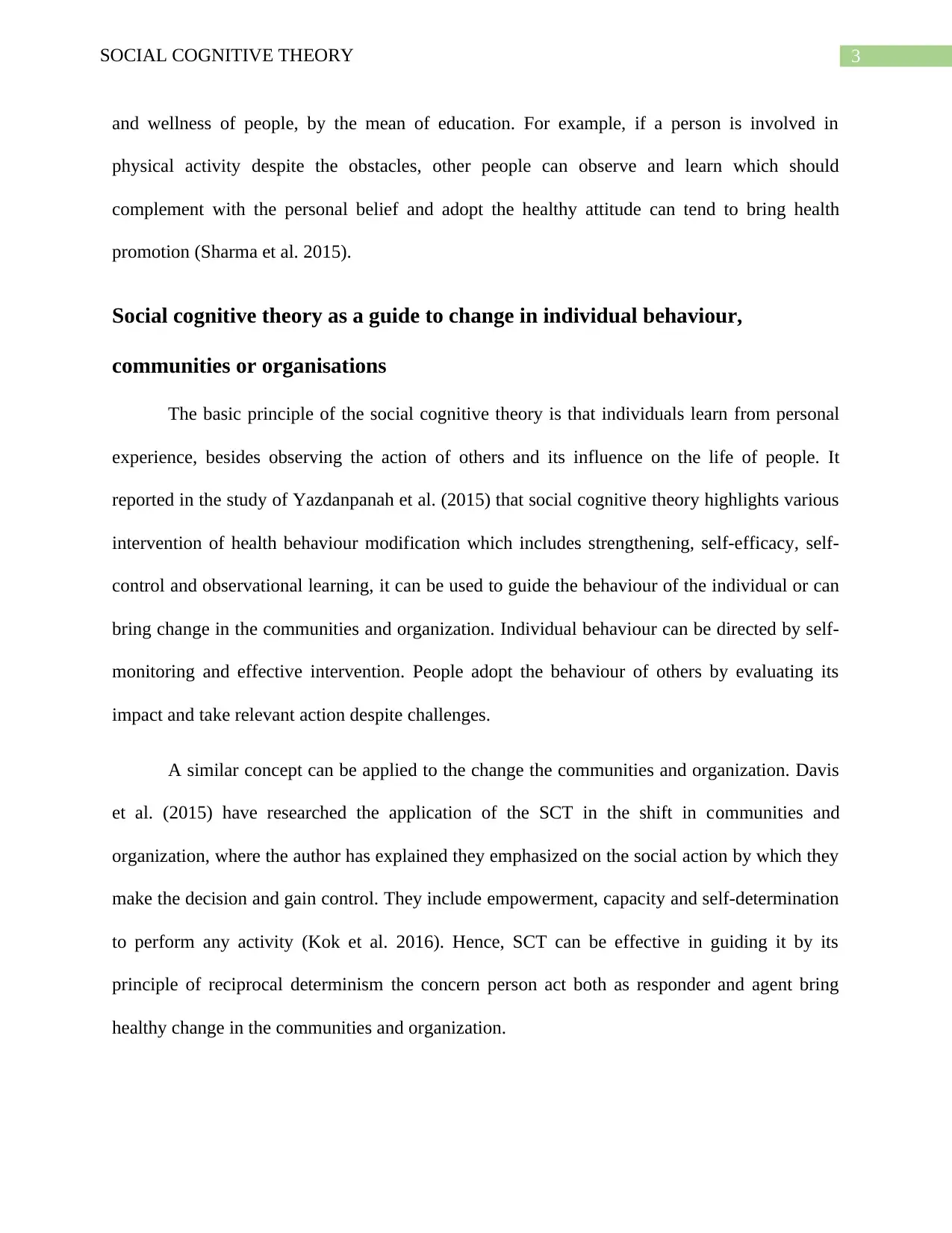
3SOCIAL COGNITIVE THEORY
and wellness of people, by the mean of education. For example, if a person is involved in
physical activity despite the obstacles, other people can observe and learn which should
complement with the personal belief and adopt the healthy attitude can tend to bring health
promotion (Sharma et al. 2015).
Social cognitive theory as a guide to change in individual behaviour,
communities or organisations
The basic principle of the social cognitive theory is that individuals learn from personal
experience, besides observing the action of others and its influence on the life of people. It
reported in the study of Yazdanpanah et al. (2015) that social cognitive theory highlights various
intervention of health behaviour modification which includes strengthening, self-efficacy, self-
control and observational learning, it can be used to guide the behaviour of the individual or can
bring change in the communities and organization. Individual behaviour can be directed by self-
monitoring and effective intervention. People adopt the behaviour of others by evaluating its
impact and take relevant action despite challenges.
A similar concept can be applied to the change the communities and organization. Davis
et al. (2015) have researched the application of the SCT in the shift in communities and
organization, where the author has explained they emphasized on the social action by which they
make the decision and gain control. They include empowerment, capacity and self-determination
to perform any activity (Kok et al. 2016). Hence, SCT can be effective in guiding it by its
principle of reciprocal determinism the concern person act both as responder and agent bring
healthy change in the communities and organization.
and wellness of people, by the mean of education. For example, if a person is involved in
physical activity despite the obstacles, other people can observe and learn which should
complement with the personal belief and adopt the healthy attitude can tend to bring health
promotion (Sharma et al. 2015).
Social cognitive theory as a guide to change in individual behaviour,
communities or organisations
The basic principle of the social cognitive theory is that individuals learn from personal
experience, besides observing the action of others and its influence on the life of people. It
reported in the study of Yazdanpanah et al. (2015) that social cognitive theory highlights various
intervention of health behaviour modification which includes strengthening, self-efficacy, self-
control and observational learning, it can be used to guide the behaviour of the individual or can
bring change in the communities and organization. Individual behaviour can be directed by self-
monitoring and effective intervention. People adopt the behaviour of others by evaluating its
impact and take relevant action despite challenges.
A similar concept can be applied to the change the communities and organization. Davis
et al. (2015) have researched the application of the SCT in the shift in communities and
organization, where the author has explained they emphasized on the social action by which they
make the decision and gain control. They include empowerment, capacity and self-determination
to perform any activity (Kok et al. 2016). Hence, SCT can be effective in guiding it by its
principle of reciprocal determinism the concern person act both as responder and agent bring
healthy change in the communities and organization.
Paraphrase This Document
Need a fresh take? Get an instant paraphrase of this document with our AI Paraphraser
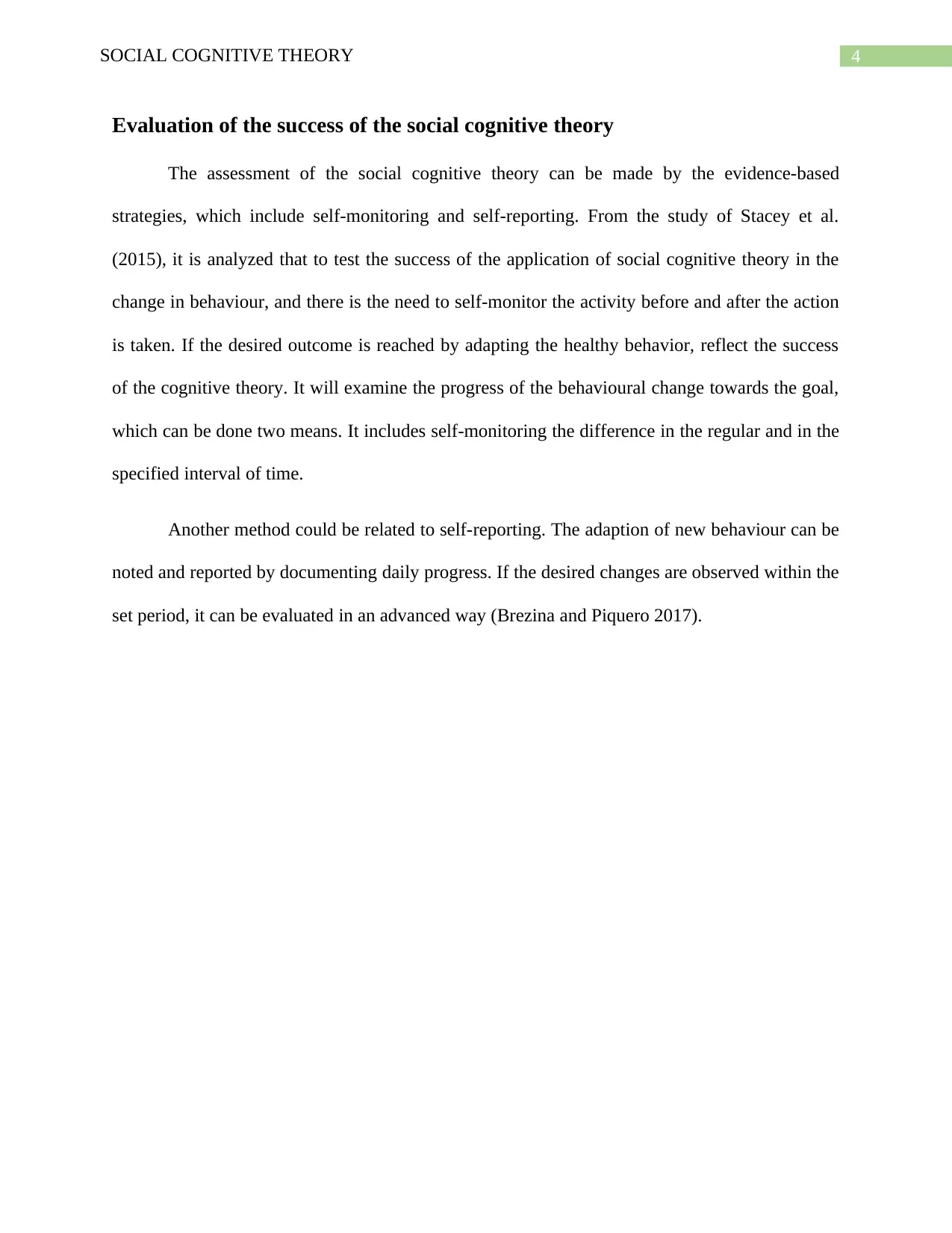
4SOCIAL COGNITIVE THEORY
Evaluation of the success of the social cognitive theory
The assessment of the social cognitive theory can be made by the evidence-based
strategies, which include self-monitoring and self-reporting. From the study of Stacey et al.
(2015), it is analyzed that to test the success of the application of social cognitive theory in the
change in behaviour, and there is the need to self-monitor the activity before and after the action
is taken. If the desired outcome is reached by adapting the healthy behavior, reflect the success
of the cognitive theory. It will examine the progress of the behavioural change towards the goal,
which can be done two means. It includes self-monitoring the difference in the regular and in the
specified interval of time.
Another method could be related to self-reporting. The adaption of new behaviour can be
noted and reported by documenting daily progress. If the desired changes are observed within the
set period, it can be evaluated in an advanced way (Brezina and Piquero 2017).
Evaluation of the success of the social cognitive theory
The assessment of the social cognitive theory can be made by the evidence-based
strategies, which include self-monitoring and self-reporting. From the study of Stacey et al.
(2015), it is analyzed that to test the success of the application of social cognitive theory in the
change in behaviour, and there is the need to self-monitor the activity before and after the action
is taken. If the desired outcome is reached by adapting the healthy behavior, reflect the success
of the cognitive theory. It will examine the progress of the behavioural change towards the goal,
which can be done two means. It includes self-monitoring the difference in the regular and in the
specified interval of time.
Another method could be related to self-reporting. The adaption of new behaviour can be
noted and reported by documenting daily progress. If the desired changes are observed within the
set period, it can be evaluated in an advanced way (Brezina and Piquero 2017).
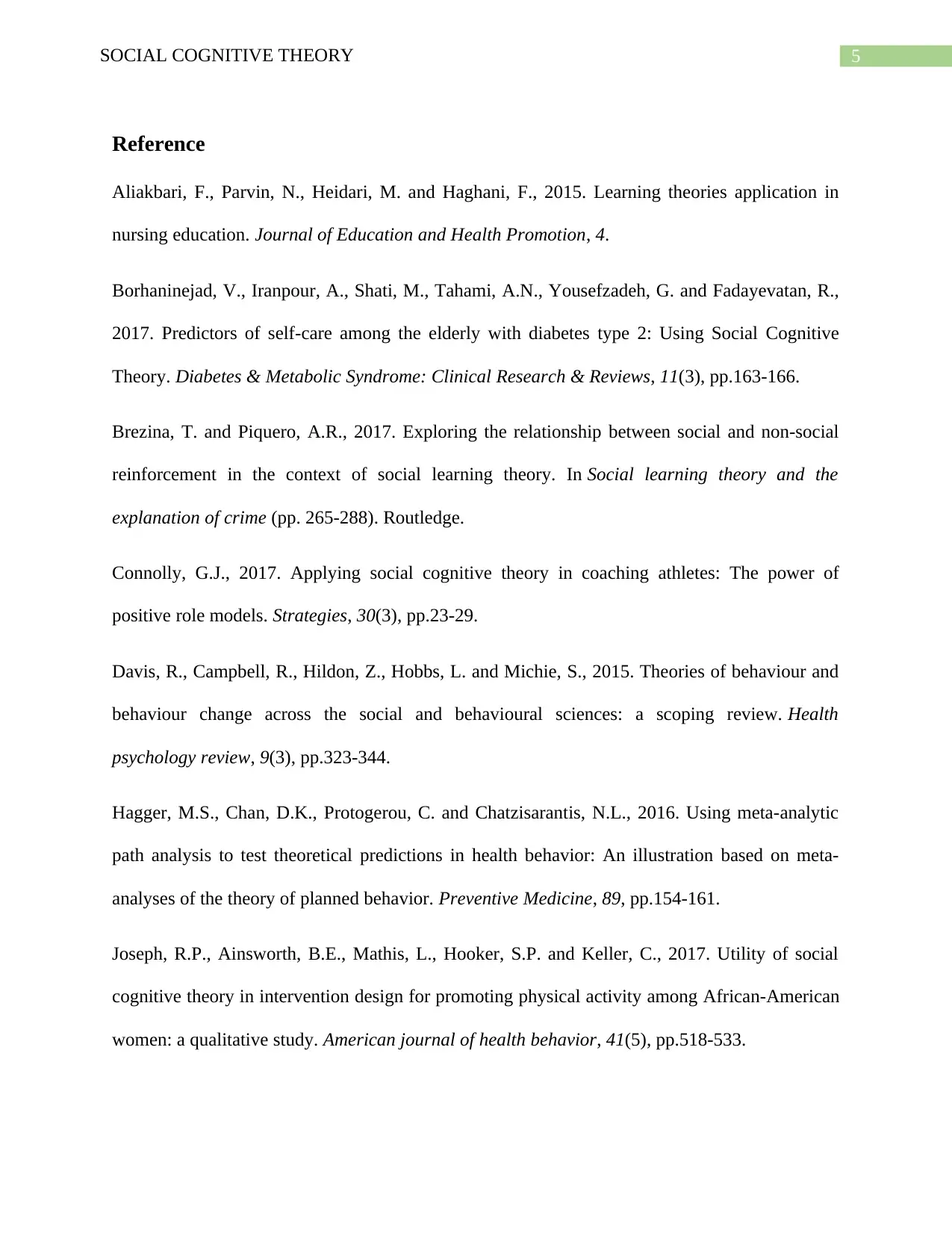
5SOCIAL COGNITIVE THEORY
Reference
Aliakbari, F., Parvin, N., Heidari, M. and Haghani, F., 2015. Learning theories application in
nursing education. Journal of Education and Health Promotion, 4.
Borhaninejad, V., Iranpour, A., Shati, M., Tahami, A.N., Yousefzadeh, G. and Fadayevatan, R.,
2017. Predictors of self-care among the elderly with diabetes type 2: Using Social Cognitive
Theory. Diabetes & Metabolic Syndrome: Clinical Research & Reviews, 11(3), pp.163-166.
Brezina, T. and Piquero, A.R., 2017. Exploring the relationship between social and non-social
reinforcement in the context of social learning theory. In Social learning theory and the
explanation of crime (pp. 265-288). Routledge.
Connolly, G.J., 2017. Applying social cognitive theory in coaching athletes: The power of
positive role models. Strategies, 30(3), pp.23-29.
Davis, R., Campbell, R., Hildon, Z., Hobbs, L. and Michie, S., 2015. Theories of behaviour and
behaviour change across the social and behavioural sciences: a scoping review. Health
psychology review, 9(3), pp.323-344.
Hagger, M.S., Chan, D.K., Protogerou, C. and Chatzisarantis, N.L., 2016. Using meta-analytic
path analysis to test theoretical predictions in health behavior: An illustration based on meta-
analyses of the theory of planned behavior. Preventive Medicine, 89, pp.154-161.
Joseph, R.P., Ainsworth, B.E., Mathis, L., Hooker, S.P. and Keller, C., 2017. Utility of social
cognitive theory in intervention design for promoting physical activity among African-American
women: a qualitative study. American journal of health behavior, 41(5), pp.518-533.
Reference
Aliakbari, F., Parvin, N., Heidari, M. and Haghani, F., 2015. Learning theories application in
nursing education. Journal of Education and Health Promotion, 4.
Borhaninejad, V., Iranpour, A., Shati, M., Tahami, A.N., Yousefzadeh, G. and Fadayevatan, R.,
2017. Predictors of self-care among the elderly with diabetes type 2: Using Social Cognitive
Theory. Diabetes & Metabolic Syndrome: Clinical Research & Reviews, 11(3), pp.163-166.
Brezina, T. and Piquero, A.R., 2017. Exploring the relationship between social and non-social
reinforcement in the context of social learning theory. In Social learning theory and the
explanation of crime (pp. 265-288). Routledge.
Connolly, G.J., 2017. Applying social cognitive theory in coaching athletes: The power of
positive role models. Strategies, 30(3), pp.23-29.
Davis, R., Campbell, R., Hildon, Z., Hobbs, L. and Michie, S., 2015. Theories of behaviour and
behaviour change across the social and behavioural sciences: a scoping review. Health
psychology review, 9(3), pp.323-344.
Hagger, M.S., Chan, D.K., Protogerou, C. and Chatzisarantis, N.L., 2016. Using meta-analytic
path analysis to test theoretical predictions in health behavior: An illustration based on meta-
analyses of the theory of planned behavior. Preventive Medicine, 89, pp.154-161.
Joseph, R.P., Ainsworth, B.E., Mathis, L., Hooker, S.P. and Keller, C., 2017. Utility of social
cognitive theory in intervention design for promoting physical activity among African-American
women: a qualitative study. American journal of health behavior, 41(5), pp.518-533.
⊘ This is a preview!⊘
Do you want full access?
Subscribe today to unlock all pages.

Trusted by 1+ million students worldwide
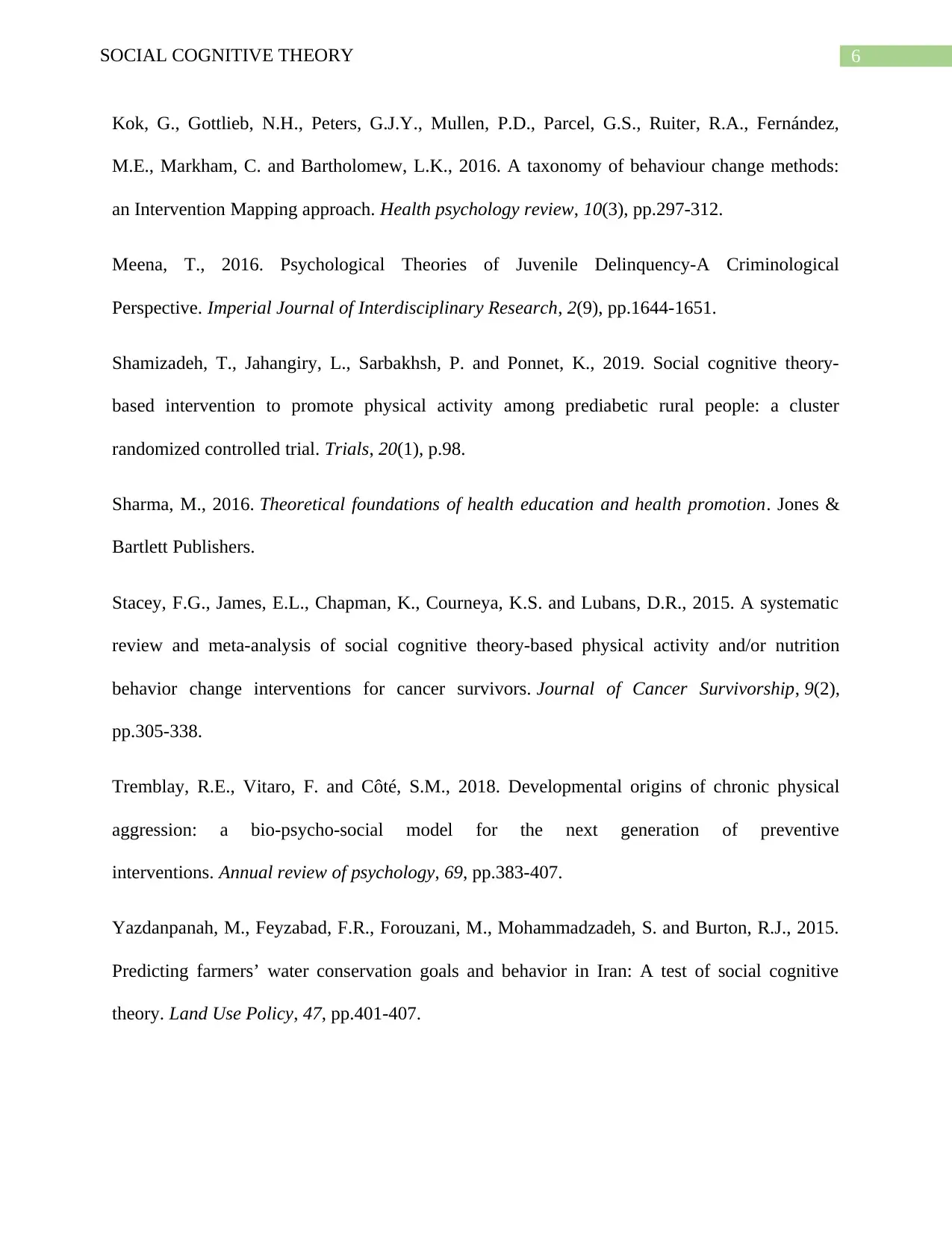
6SOCIAL COGNITIVE THEORY
Kok, G., Gottlieb, N.H., Peters, G.J.Y., Mullen, P.D., Parcel, G.S., Ruiter, R.A., Fernández,
M.E., Markham, C. and Bartholomew, L.K., 2016. A taxonomy of behaviour change methods:
an Intervention Mapping approach. Health psychology review, 10(3), pp.297-312.
Meena, T., 2016. Psychological Theories of Juvenile Delinquency-A Criminological
Perspective. Imperial Journal of Interdisciplinary Research, 2(9), pp.1644-1651.
Shamizadeh, T., Jahangiry, L., Sarbakhsh, P. and Ponnet, K., 2019. Social cognitive theory-
based intervention to promote physical activity among prediabetic rural people: a cluster
randomized controlled trial. Trials, 20(1), p.98.
Sharma, M., 2016. Theoretical foundations of health education and health promotion. Jones &
Bartlett Publishers.
Stacey, F.G., James, E.L., Chapman, K., Courneya, K.S. and Lubans, D.R., 2015. A systematic
review and meta-analysis of social cognitive theory-based physical activity and/or nutrition
behavior change interventions for cancer survivors. Journal of Cancer Survivorship, 9(2),
pp.305-338.
Tremblay, R.E., Vitaro, F. and Côté, S.M., 2018. Developmental origins of chronic physical
aggression: a bio-psycho-social model for the next generation of preventive
interventions. Annual review of psychology, 69, pp.383-407.
Yazdanpanah, M., Feyzabad, F.R., Forouzani, M., Mohammadzadeh, S. and Burton, R.J., 2015.
Predicting farmers’ water conservation goals and behavior in Iran: A test of social cognitive
theory. Land Use Policy, 47, pp.401-407.
Kok, G., Gottlieb, N.H., Peters, G.J.Y., Mullen, P.D., Parcel, G.S., Ruiter, R.A., Fernández,
M.E., Markham, C. and Bartholomew, L.K., 2016. A taxonomy of behaviour change methods:
an Intervention Mapping approach. Health psychology review, 10(3), pp.297-312.
Meena, T., 2016. Psychological Theories of Juvenile Delinquency-A Criminological
Perspective. Imperial Journal of Interdisciplinary Research, 2(9), pp.1644-1651.
Shamizadeh, T., Jahangiry, L., Sarbakhsh, P. and Ponnet, K., 2019. Social cognitive theory-
based intervention to promote physical activity among prediabetic rural people: a cluster
randomized controlled trial. Trials, 20(1), p.98.
Sharma, M., 2016. Theoretical foundations of health education and health promotion. Jones &
Bartlett Publishers.
Stacey, F.G., James, E.L., Chapman, K., Courneya, K.S. and Lubans, D.R., 2015. A systematic
review and meta-analysis of social cognitive theory-based physical activity and/or nutrition
behavior change interventions for cancer survivors. Journal of Cancer Survivorship, 9(2),
pp.305-338.
Tremblay, R.E., Vitaro, F. and Côté, S.M., 2018. Developmental origins of chronic physical
aggression: a bio-psycho-social model for the next generation of preventive
interventions. Annual review of psychology, 69, pp.383-407.
Yazdanpanah, M., Feyzabad, F.R., Forouzani, M., Mohammadzadeh, S. and Burton, R.J., 2015.
Predicting farmers’ water conservation goals and behavior in Iran: A test of social cognitive
theory. Land Use Policy, 47, pp.401-407.
1 out of 7
Related Documents
Your All-in-One AI-Powered Toolkit for Academic Success.
+13062052269
info@desklib.com
Available 24*7 on WhatsApp / Email
![[object Object]](/_next/static/media/star-bottom.7253800d.svg)
Unlock your academic potential
Copyright © 2020–2026 A2Z Services. All Rights Reserved. Developed and managed by ZUCOL.





